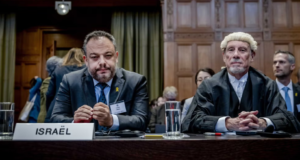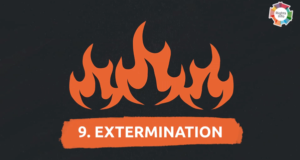by Nir Nader, Workers Advice Centre
Imad Abu Amara leads me through the corridors of the Ted Arison Tower of Ichilov Hospital, to the wounded victims of the massacre at Beit Hanoun. Imad, 50, is not among Beit Hanoun’s wounded. He is from Rafah, and already very familiar with hospital admissions. For 16 years he has been nursing his wife who was traumatized by shelling near their home which killed two and wounded dozens. But now a new slaughter has overshadowed the victims of the last shelling – who now remembers this killing?
On the fifth floor we meet Nahil Athamneh and Abed el-Hakim Athamneh, both Beit Hanoun residents in their forties. On Wednesday the 8th of November, at ten past five in the morning, they woke up in terror to the deafening sound of bombing. “They had never shelled our neighborhood before. The army has been bombing for two years already, but never near us,” Abed el-Hakim says. “The day before, they patrolled our neighborhood, entered houses to check for Qassam rockets, and even joked with us and smoked a narghile [hookah].” He stops talking abruptly and stares at the wall.
Five minutes, twenty killed
“At ten past five the first shell landed,” Nahil continues where Abed el-Hakim stopped. “Within a few seconds we heard shouts. I went outside and saw another shell land, and ran to see what had happened to the people living there. They are all members of my family. I saw them running down the stairs to escape, then a shell caught them, leaving chaos of blood and body parts.”
“I picked up my 12 year old cousin Muhammad Jamal Athamneh and saw that his hand was severed. I put him in a car that was going to the new Beit Hanoun hospital, which was opened just four months ago. Then I came back to pick up someone else, and saw my cousin’s hand on the ground. I ran to the car to put the severed hand in too.
“There was a minute of silence, with only the sounds of the wounded and dust in the air. I ran down the passage between the damaged houses with two friends, Sagar Adwan and Muhammad Athamneh, to take out the wounded, Sagar and Muhammad had already reached the entrance of the house when I suddenly heard the screech of a shell behind me. I crouched against the wall and the shell hit the entrance, killing nine people who were trying to escape, including my two friends.
“There was lots of dust and smoke. It was impossible to enter the houses. Then the first ambulance came. The shells continued to fall. The shelling lasted five minutes and killed 19 people [another died at Ichilov Hospital – N.N.]… Now nobody wants to live in that neighborhood. They are scared there will be more bombings. The neighborhood is empty – everyone has gone to stay with other members of their families,” Nahil adds.
A visit to Tel Aviv
Abed el-Hakim Athamneh came to Ichilov Hospital with his nephew Ahmed Masound Athamneh, 21, who has recently become engaged. He was sleeping when the first shell landed. In the minute before the second shell landed, he was unable to escape with the others and a wall collapsed on top of him. “That is what saved him,” says Abed el-Hakim. Ahmed’s father and three sisters were killed. His mother Jamila is hospitalized in the next room.
He continues “Before the shelling, Beit Hanoun was under curfew for five days. About 2000 men above the age of 16 were arrested from our neighborhood alone. They were handcuffed and blindfolded and taken to be interrogated in the school yard. For five days they questioned them one by one, and released only those whose interrogation was completed.”
Abed el-Hakim Athamneh worked for 14 years in construction in Israel, but since the Intifada he has not worked – six years without work. “They have locked us in a refuse to open the gate. We live off UN contributions. Once a month we get some basic necessities. Israel claims it is shelling because of the Qassams, but it is not us who fire the rockets. At five in the morning we are in bed. They shell innocent people while they sleep,” Abed el-Hakim says.
“It’s the workers who bear the brunt. Not only do they leave us without work – they bomb us too. I worked on many buildings in Tel Aviv. I know the city better than I know Gaza. I used to get up at four in the morning and return home at eight in the evening. I haven’t been in Tel Aviv for six years. I never thought I would return under these circumstances.”
Behind Ahmed’s bed, Tel Aviv’s old northern quarter lies, and in the distance the Mediterranean can be seen. These workers from Beit Hanoun, whom circumstances have reduced to poverty, are stuck in the Gaza Strip and punished by orders forbidding them to reach their places of work. Now the same state the shells them, kills them and wounds them has given them the opportunity to get a glimpse of one of the richest cities in the Middle East.
“He wants us to take him on a tour of the city,” Abed el-Hakim confides as he glances at Ahmed. “We told him to have patience, to wait until he gets better – you can’t leave your bed like that, we said.”
“There are many well-educated people and many workers in Beit Hanoun,” Abed el-Hakim continues. Today they are all unemployed and just want to work. But there is no work. People who once worked for the PA for 1500 shekels a month make do with 400 shekels if they can get it… I use my savings to live. I opened a clothes store three years ago, but a week and a half ago the army smashed the windows and threw hand grenades inside the store. Everything was destroyed. Seven years ago, when my child would ask me for a shekel to buy some candy, I would give him five shekels. Today when he asks for a shekel, I tell him that I’ll give him one later and hope he’ll forget.
“I can’t think of a solution. And there is nobody we can turn to or sue or demonstrate against. There is no PA, no Hamas, no Abu Mazen. We don’t know where all this will lead. We’ve got used to living without any government, without any work and without a solution.”
 International Solidarity Movement Nonviolence. Justice. Freedom.
International Solidarity Movement Nonviolence. Justice. Freedom.


